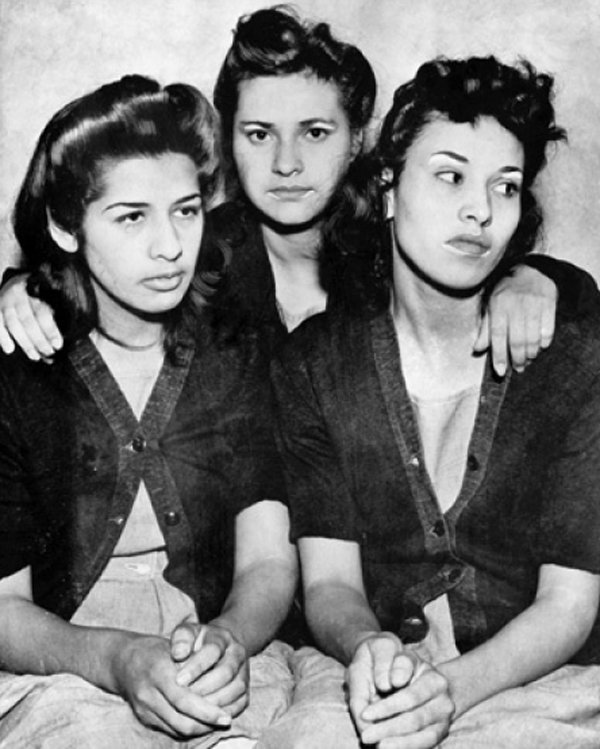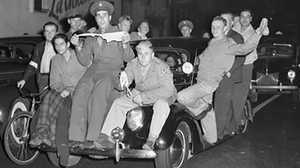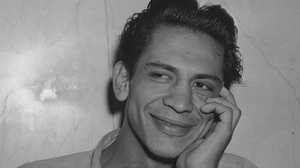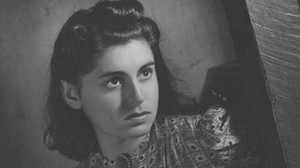Lorena Encinas (1922-1991)

Lorena Rosalee Encinas was born on September 4, 1922, in Nogales, Arizona. At the time, her parents, Lorena Gerlach and Teodoro Encinas, had just recently immigrated from Mexico. She was the third child born to the Encinas family, but would not be the last. Nearly two years later, she would have a little brother, named Louis Jesus, to whom she would be completely devoted. She would protect him all her life, even at the expense of her own freedom.
Soon after Louie's birth, the Encinas family moved to Los Angeles and settled in the Clanton/38th Street neighborhood. Lorena Encinas attended Jefferson High School there and made many friends. She enjoyed the skills she learned in Home Economics class and when she wasn't in school, she loved to attend parties and especially, to go dancing.
Tragedy struck the family, however, when Lorena Encinas was only 13 years old. Her father died, most likely of cancer-related stomach problems, leaving a family of five. Louie Encinas took his father's death hard and very quickly started getting into trouble. In the years to come, he would be in and out of reform schools.
According to Ted Encinas, Lorena's son, on the evening of August 1, 1942, Lorena attended a birthday party at the Williams ranch. She told her children decades later that Louis and some friends had crashed that party, and after a brief altercation the family ordered him to leave. He told her that upon leaving, he and his friends encountered a boy who had just left the party and "jumped him." Later, when the Los Angeles police answered a call that there had been a murder near the house, they questioned Lorena. She refused to say anything and was subsequently taken into custody. Over the next couple of days, the police conducted a dragnet, detaining and questioning over 600 people in order to stem what they saw as the growing delinquency of Mexican American youth in Los Angeles.
In October of 1942 a group of mostly Mexican American young men were put on trial for the murder of José Díaz. Lorena and several other young women had been placed in the Los Angeles County Jail on suspicion of wrongdoing immediately following the murder on August 2. The police and the press perceived the women as the female counterparts, and therefore accomplices, to the "gang" of boys who were rounded up. The young women who shared Lorena's plight included others from the 38th Street neighborhood: Frances Silva, Josephine and Juanita Gonzales, and Dora Barrios.
During the trial, the young women were called to testify for the prosecution, but they refused to cooperate. Lorena, who had an insight into the murder that the others didn't, adamantly rebuffed the prosecution's attempts to get a confession or to point the finger at any of the young men on trial. Lorena had much to lose as the result of her silence.
Lorena was taken into custody at the Ventura School for Girls, a draconian reformatory, without benefit of jury or trial. She left behind a newborn son, Ted, and gave up the next year of her life. The reformatory was a facility for wayward and sexually promiscuous young women; having a daughter incarcerated there was a great shame for any family. "Young women would go to very drastic measures in order to escape going to the Ventura School for Girls because of its bad reputation," explains historian Elizabeth Escobedo. "There were women at the juvenile hall who... were swallowing safety pins the night before in order to get out of it."
Lorena had to give her child up to her mother to raise for the length of her internment. Her brother Louie's safety, however, was preeminent to her and she would allow her friends and herself to be locked up before implicating him. Louie had had a close call as it was. According to Lorena, he had been picked up in the citywide dragnet, but was released when the 600-strong group had been whittled down to the 22 boys who eventually were put on trial.
Lorena was released when she turned 21 on September 4, 1943. She immediately went to work to help support her mother, her son, and her siblings. She worked as a riveter on bomber aircraft until the end of World War II. In 1944, she married Raymond Torres and later adopted a baby girl.
As the years passed, Lorena's relationship with Louie remained a close and protective one. While he was in and out of prisons, she wrote him and lent him money regularly -- when her other siblings would not. In fact, she became the foster parent of his children while he was incarcerated in the late 1940s and early 1950s. She was devastated when he committed suicide while holding up a Los Angeles branch of the Bank of America in 1972.
Lorena revealed her secret about the Sleepy Lagoon murder to her children shortly before her own death on January 5, 1991. She died of cancer of the bronchial tubes and lungs. She is survived by her son, Theodore, and daughter, Judy.
The other women who were incarcerated at Ventura with Lorena remain silent about the event to this day. They refuse all interviews and attempts to be contacted.

Dr. Eduardo Obregón Pagán is the Bob Stump Endowed Professor of History at Arizona State University, and Associate Dean of Barrett, The Honors College. He is the author of Murder at the Sleepy Lagoon: Zoot Suits, Race, and Riot in Wartime L.A. (University of North Carolina Press, 2004), and Valley of the Guns: The Pleasant Valley War and the Trauma of Violence (University of Oklahoma Press, 2018). He was a co-host on the popular PBS series History Detectives, and is an adjunct curator of history at the Desert Caballeros Western Museum.







